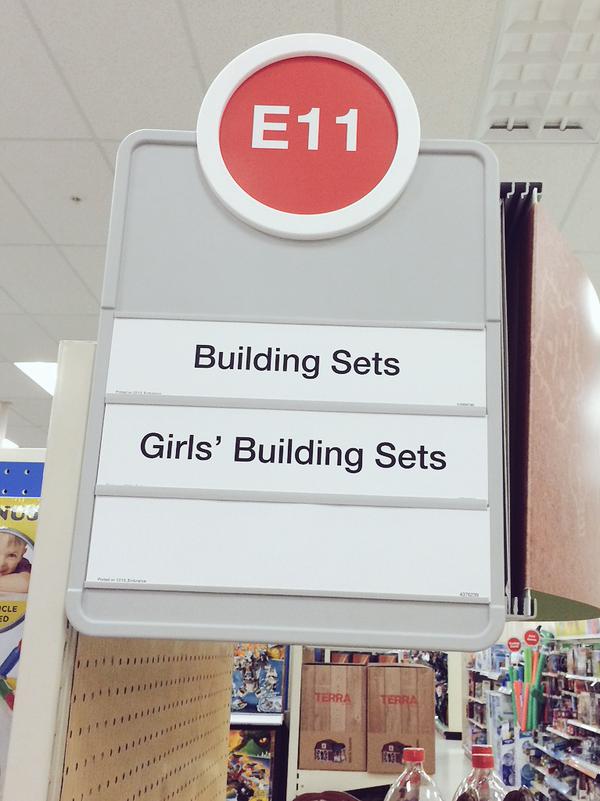Target has been in the headlines the last few days for its decision to remove gendered labeling from its toys and bedding aisles. “For example,” they wrote in a corporate blog post/press release, “in the kids’ Bedding area, signs will no longer feature suggestions for boys or girls, just kids.” It’s a laudable move, understanding that little girls might want Superman sheets just as much as little boys might like My Little Ponies. (Fingers crossed they don’t become bronies.) The mega retailer had recently come under fire when Ohio shopper Abi Bechtel posted an image to Twitter that showed Target selling “building sets” separately from “girls’ building sets.”
Don't do this, @Target pic.twitter.com/cfh3cp5Nqa
— Abi Bechtel (@abianne) June 1, 2015
Target’s response has been measured; they are not removing the “Men’s” and “Women’s” labels from their clothing or shoes sections. You might not expect the announcement to meet with much resistance, but then, you haven’t met some of the people who are really big on reinforcing gender stereotypes.
Grant Castleberry, the executive director of the Council for Biblical Manhood & Womanhood (CBMW), wrote a post today called “Missing the Target: Some Brief Thoughts on Target’s Cultural Capitulation.” First of all, Castleberry is convinced that this change is not reflective of any larger cultural reality. “Boys will still want to play with Legos and sleep on Superman sheets, and girls will still want Barbie dolls and a Sofia pillow-case,” he writes. I don’t know what Sofia is, because I am a 30 year-old childless woman, but I can tell you that my friends and I played with Legos a great deal more than we ever played with Barbies, except when we were beheading the Barbie dolls and putting their heads on spikes.
It doesn’t end there, though. Castleberry doesn’t see this as a poorly informed but ultimately harmless decision by one of the nation’s largest retailers; instead, he sees Target’s move as a denial of the fundamental reality of what it means to be human: Gender. He writes:
“[I]n a world where the very concept of gender is being neutralized, and in a society where parents themselves are trying to outrun their own gender identities, dragging their children onto their own dark labyrinths (look no further than Bruce Jenner at the ESPY’s), this only adds to the problem.
Rather than reinforcing maleness and femaleness, this confuses it.
Instead of helping guide children towards embracing who they actually are, this blurs reality.”
Castleberry goes on to say that “gender has meaning,” which, presumably, Target is trying to deny? I’m not sure how that works, although I do believe he perceives this action as a very real threat to values he holds dear. “The Bible teaches that men are wired by God to protect and to pursue,” he writes, which is interesting, because it’s wrong. The Bible never teaches that. That’s a cultural understanding of a man’s wiring, not Biblical, and boys who want to play with Barbies are just as much boys as those who play with GI Joes. By insisting otherwise, Castleberry is actually reducing Biblical masculinity to what we consume: Protector-boys flock to Legos; Nurturer-girls want Barbies.
If you want to argue that gender has meaning, you have to locate that meaning somewhere outside the aisles of Target.
As for me, I’m with Riley: “Some girls want to have superheroes; some girls want to have princesses. Some boys want to have superheroes; some boys want to have princesses.”





